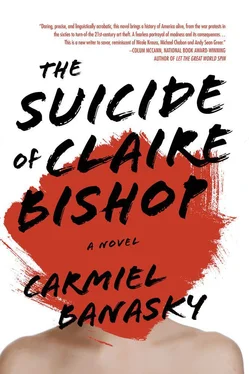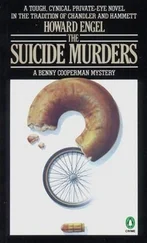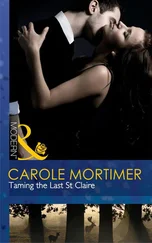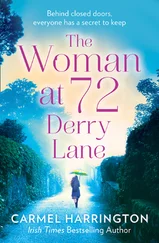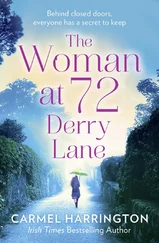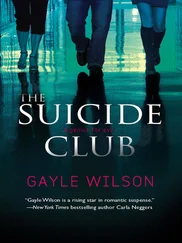She closed her eyes but couldn’t sleep. It would be a miracle if she didn’t catch what Freddie had. There was the ocean and there was the night. Her father’s jawline, then the back of his head. A big gray dog. She heard a noise, a crush in the darkness. She woke in a panic. Something was on her mouth, a vise — afraid, so intensely afraid she would die, and the dog and her father a mile down the beach. Freddie’s hand was cupping her jaw. He said she woke him with her grinding teeth. This had happened before but each time was new. She was scared of waking in his grip.
Both of them only half awake, he pulled up her nightgown. He climbed on top of her, his head buried in her hair. But she saw, briefly, how tightly his eyes were closed. He smelled wrong. She didn’t want him in her, but how could she say no after what she’d done. She wanted desperately to overwrite it, to erase it with Freddie. Without even touching her, he tried to push inside, and she tried to let him.
“We can try again,” she said. But he rolled off, mumbling he was too tired and sick anyway.
In the dark shadows of pillows, she covered her ears and heard only the inside of her cupped palms and the inside of her head, a storm system of silence. Claire imagined what it would be like to go mad — her old inventions. The voices she would hear, like a light drizzle all around her.
They drove north in midday traffic, Claire resting her forehead on the cool glass of the passenger window. Freddie had said he needed fresh air and that he knew how badly Claire wanted to see the leaves turn. He wouldn’t want her to miss that confetti ground.
Central Park. Then the Bronx and the Bronx Zoo, the children standing on street corners in thin coats, their fists hidden inside sleeves, sleeves holding radios. She caught pieces of songs. At a stop sign she heard Ray Charles, his bent-branch moan. She nodded her head to it and they drove on. An hour upstate they reached a dirt road and a small patch of trampled grass. They’d been here once, long before. They congratulated one another on finding it again.
The lookout point was a mile from the car, a view of the Hudson waiting there. The short walk proved difficult for ill Freddie, and he stubbed his toe on a rock. Nevertheless, he said he felt invigorated. He wandered off to the edge on his own, and she watched his back. He’d worn his gray trench coat and struggled to take it off. It swashed and moved with his body; it seemed too big for him now. Ahead of her, in the light and shadows, he was nearly camouflaged. But a moment later she heard his voice calling to her. “Get over here. It’s beautiful.”
Claire lagged behind along the path and the loud leaves sounded like cracking joints. She breathed the cold air into her lungs. It felt good. A cigarette would also feel good. A hand-rolled cigarette. She reached Freddie, leaned against him and looked at the river not so far below, the water shimmering in the breeze.
“We haven’t done anything like this in ages,” Freddie said.
“Why is that?”
“We could try. We should try to be good.” Freddie made her look him in the eyes. “I want to be good to you, Claire.”
She pulled away slightly to look at him better. “Is that so?” She tried to sound light, and thought: how funny that I do not feel a thing.
“You know you’re very hard to please,” said Freddie.
“And you’re so easy,” Claire said. She was smiling, wasn’t she?
“We should take a trip. We could go back to Cuba for our anniversary.”
“We could go to Ovid.”
“We’ll talk about it.” Freddie leaned in, spoke into her hair. “We’re all alone up here. No one around for miles.”
Claire turned from the wet of his breath, his arms around her waist.
He grinned. “You know I could kill you and no one would ever know.”
“That’s not funny.”
“I could, and then leave you here. Who would know?”
Claire did not answer.
He laughed sharply. “But I won’t. That’s the point. That’s how much I love you. I could, but I won’t.”
He took her silence to be anger — how would he know it was indifference?
He said, “It’s a joke, Claire. Come on. Come here.” He pulled her closer and tried to kiss her mouth, but she turned and he settled for her ear. The Hudson moved beneath them.
“You could barely walk up that hill, let alone fight me,” she said.
“It was a mountain,” Freddie mumbled. He let go and walked farther along the path, into the woods. She could not say out loud that she did not love him, because then it might be true.
I could kill you, you mean.
Freddie was on his way out to see the doctor when Tomasz appeared in the open doorway of the apartment. Claire stood by as Freddie shook his hand heartily. “Good to see you,” Freddie said.
Tomasz smiled. “You don’t look well, sir.” He wiped the hand Freddie had shook on his pant leg.
“That’s what she tells me.” Freddie waited. “Is there something you need from me?”
“Just here to have a word with your wife.”
Freddie glanced at Claire, who hadn’t let out a breath. But he didn’t pause on this long. “About the building board?”
“Yes,” Tomasz said.
When the elevator doors shut on Freddie, Tomasz reached for Claire’s hand and she pulled away from him with the pretense of searching through her purse for her powder. She could not feel her own face.
“Well?” Claire said, not meeting his eyes.
He stood there with his hands in his pockets, a smirk on his face.
“I’m very busy,” Claire said.
“You are a funny woman, Mrs. Bishop,” he said. Then he shrugged and handed her a stiff, charred piece of canvas: it was from the bottom right corner of the painting. Claire could make out the last of Nicolette’s signature, missing the N . He showed her a blister forming between his knuckles. “I forgot to cut it out until I’d already lit the fire. I burned my finger.”
“I told you I didn’t want to know.” She was surprised by the anger in her voice.
He took off his hat and bounced it in his hands.
Claire forced a smile. “Thank you, Tomasz.” She slipped the proof into the pocket of her suede coat. Again she unclasped her purse. “I’m sorry, I’m not carrying much on me now.” And she continued to dig for the money she knew she’d somehow have to get from Freddie.
Claire stood in the doorway of her empty bedroom and looked in, like it was a museum installation and she was on the other side of the velvet rope. The king-sized bed, the paperbacks on the nightstand, Freddie’s filthy socks draped over the hamper in an attempt at tidiness — everything in its place, as if people lived there.
And then the bedroom was not empty. There was Freddie, lying in bed, and she was in the armchair in the corner of the room, her art history book face down on her lap. He was re-reading his signed copy of Carnegie’s How to Win Friends and Influence People . The doctor had diagnosed some kind of respiratory ailment with syllables that were new to her. She felt she could see his infection writhing in his lungs.
There was a space of carpet between them that seemed to help her. She was wide awake. The room drenched in lamplight, soft, yellow. She hadn’t planned to speak but then she was saying, “I don’t really care that you’re sick.” The bedside clock ticked and she looked over like it had whispered something she had not quite understood and needed repeating.
He rolled on his side and propped his head on his elbow to look at her.
“I think we should separate.” She said that. She did.
A hesitation, very small. “You don’t mean that.” He didn’t sound surprised or hurt, merely pragmatic. But perhaps that was another mask Claire could no longer penetrate.
Читать дальше
